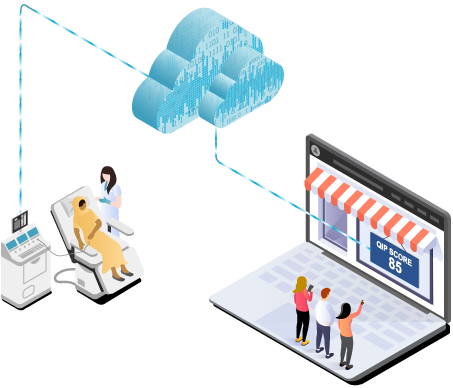Case Study
Enhancing quality reporting system for better healthcare decisions
Indicators of quality care for dialysis centers

The client
Centers for Medicare & Medicaid Services
End-Stage Renal Disease Quality Incentive Program
Challenge
According to the National Institute of Diabetes and Digestive and Kidney Diseases (NIDDK), over 800,000 people suffer from End-Stage Renal Disease (ESRD), and 69 percent of them require regular dialysis. After their diagnosis, people need to make life-enhancing decisions about where to get their dialysis while coping with the physical discomfort and emotional stress of their illness.
The Centers for Medicare & Medicaid Services (CMS) developed the ESRD Quality Incentive Program (ESRD – QIP) to ease patient hardships and frustrations and ensure they get high-quality, life-saving care by:
- Assigning up to five-star scores to individual facilities based on quality-of-care metrics.
- Allowing patients to use these scores to select the best dialysis facility for their location and specific needs.
- Entitling CMS to recall or reduce a facility’s payments if its score is too low.
CMS sought a reliable partner to meet/exceed quality standards, eliminate antiquated scores and feedback processing, and bring innovation to QIP.
Our approach
In February 2021, CMS awarded Flexion the contract to maintain, operate, and enhance the Scoring and Feedback module for the ESRD Quality Reporting System (EQRS) platform. Dialysis facility administrators, ESRD Network administrators, ESRD – QIP support agents, and CMS ESRD administrators used this module.
Using agile development practices to ensure Flexion delivered value consistently, we created scrum teams to focus on:
- Acquiring data.
- Calculating scores.
- Enhancing the user interface (UI).
- Updating the cloud layer.
We also tapped into some critical expertise by engaging with teaming partners Arbor Research, Element Solutions, and Index Analytics.
As part of our solution, EQRS uses the following technologies:
To bring compute flexibility in support of the required complex scoring algorithms, Amazon Web Services Elastic MapReduce (AWS EMR) was utilized. AWS Simple Storage Service (AWS S3) supplies a scalable and reliable storage solution for the billions of objects analyzed. AWS Elastic Container Service (AWS ECS) on AWS Fargate provides a serverless, on-demand, scalable compute engine. This project was among the first to adopt the AWS Cloud Development Kit (CDK) within CMS.
The Angular web development framework provides full features to build scalable and maintainable applications.
Technology stack
Outcomes
Based on our team’s work throughout our engagement, we helped to:
- Address vital pain points.
- Achieve CMS quality targets.
- Improved the user experience.
To consistently deliver incremental improvements, we built a new AWS infrastructure from the ground up with all stack tiers. By accomplishing these tasks, the team increased production deployments by 225 percent year over year.
In addition, we improved:
The data acquisition process
Before these changes, the manual data collection process from multiple disparate sources took over six weeks. In contrast, the new automated process completes in under two days.
The accuracy of calculated scores
We achieved CMS’s targets to ensure that all calculated scores are accurate. We implemented changes in measure calculations annually, including related reporting updates to reflect shifts in CMS priorities.
The UI
To date, we have enabled multi-year report visibility (previously, only one year was viewable) and improved the process for Tier 2 analysts to respond to questions about their scores from dialysis facilities. Through continuous user research, we are incrementally improving the application.
From this strong foundation of success, Flexion and CMS continue to work together to improve the EQRS Scoring & Feedback module.
Ready to change the way you’re doing business?
Contact us to talk about how Flexion can help your organization manage, interact with, and gain insights from data.
A proud AWS partner.

